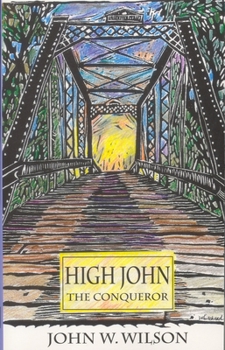High John the Conqueror: Volume 25
Select Format
Select Condition 
Book Overview
Set in the river bottoms of southeast Texas where the Navasota and Brazos rivers come together, High John the Conqueror tells the story of African American cotton farmers struggling to hold on to their land during the last years of the Great Depression. Central to the story are sharecroppers Ruby Lee and Cleveland Webster and John Cheney, a rich, white plantation owner who has farms and tenants and sharecroppers scattered all across the Brazos/Navasota country. Ruby Lee and Cleveland are sharecroppers on Cheney's land, but Cleveland's parents are struggling to hold on to the farm they have owned since the end of slavery. The Websters are about to lose their forty acres because of one flood too many and one final disastrous crop failure. John Cheney is rich enough to withstand droughts and floods, and as blacks lose their land Cheney buys it up. The Webster family land is next on Cheney's list of foreclosures. Cleveland thinks John Cheney also has an eye for Ruby Lee. In telling the story of the Websters and John Cheney, John W. Wilson captures the hopelessness of poor southern blacks during the Depression. Wilson succeeds with quiet authority in getting inside the mind and heart of a proud young black man. His portrayal of the Webster family is neither sentimental nor patronizing, and he avoids the temptation to which many white writers succumb of stereotyping black characters. He renders dialect without giving in to Uncle Remus spelling or minstrel-show comedy. John W. Wilson, who grew up in the town of Navasota in the Brazos country, is equally skilled at capturing the feel of a small town and the farming area around it.
Format:Paperback
Language:English
ISBN:0875651860
ISBN13:9780875651866
Release Date:April 1998
Publisher:Texas Christian University Press
Length:172 Pages
Weight:0.53 lbs.
Dimensions:0.6" x 5.1" x 8.1"
Customer Reviews
1 rating
A Texas Classic
Published by Thriftbooks.com User , 20 years ago
"High John the Conqueror, by John W. Wilson, was first published in 1948, and has been reissued [by TCU Press] as a volume in the publisher's Texas Traditions series of classic fiction. Set in Southeast Texas cotton plantation country, the novel tells of the struggle of one poor African American family to hold onto their land. Despite floods and crop failures, Bully Webster is determined not to let John Chaney, the rich white man who covets his farm, foreclose and leave Webster's family homeless. This sensitive portrayal of a proud, but poor, Black farmer of the Depression Era was one of the first to deal honestly with race relations in Texas, with the issue of sexual harassment, and with the plight of the small farmer. Its terse, powerful prose will keep readers enthralled." (From LIBRARY LANE, Volume 7, No. 6, Spalding University, December 1998.)





